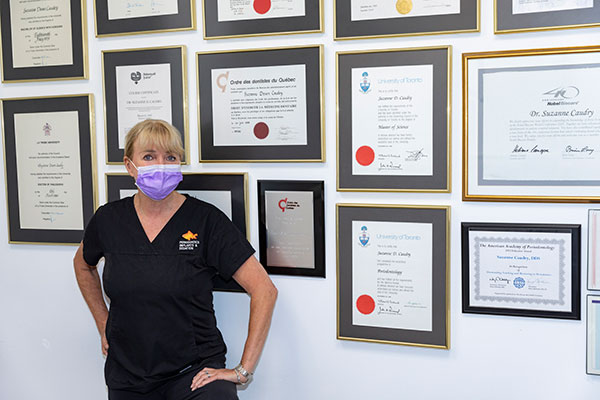Dental implants are a real blessing for those who have suffered from unhealthy gums, damaged teeth, or missing teeth. As technology continues to develop, dental implant procedures become more efficient. As if a 90-95% success rate is not wonderful enough, we predict that soon enough, the success rate will only increase. With professionals like Dr. Caudry leading the charge, increases like these are nearly certain.
The success rate of dental implants is incredible, but there are still times when a dental plant needs to be removed. In many cases, the need for removal arises shortly after implant placement surgery. Some implants need to be removed years after they were implanted.
Our goal with these blog posts is to educate our clients. With that in mind, we thought we would take some time to talk about dental implants and why sometimes they may need to be removed. We will discuss dental implants themselves, why they might need to be removed, and what the removal process looks like for patients in this blog post. We will also examine the straightforward, health-conscious ways in which you can reduce the likelihood of you ever having to remove and replace your dental implant.
Read this blog at your leisure-and be sure to direct all questions, comments, and further concerns to our team. Between Dr. Caudry and her dream team staff, we are sure we will be able to help you.
Let Us Talk About Dental Implants
Dental implants are small metal posts surgically placed into the jawbone to serve as artificial teeth roots. Over time, the bone grows around the implant, anchoring it securely in place. Once the implant is in place, a dental prosthetic (false tooth) can be attached to it.
Dental implants are an extremely popular and effective way to replace missing teeth. In fact, they have a success rate of over 95%. However, there are a few reasons why someone might need to have their dental implants removed. In times such as these, you should never postpone a visit to the dentist. If a dental implant is at risk of failure, all of the surrounding teeth-and your gums-are at risk of infection and further complications.
Thankfully, dental implant removal and replacement is a specialty of most trained professionals.
Reasons for Dental Implant Failure
There are many reasons that dental implants may need to be removed. Some of the most common reasons are:
Dental Implant Infection
If the implant becomes infected, it will need to be removed in order to prevent the infection from spreading.
Loose Dental Implants
An implant that is not properly secured can become loose over time. If this happens, it will need to be removed in order to avoid further damage to the surrounding teeth.
Unrelated Oral Trauma
In some cases, the placement of an implant can damage the adjacent teeth. If this occurs, the implant will need to be removed in order to protect the health of those teeth.
Allergic Reactions
In rare cases, people can have an allergic reaction to the materials used in dental implants. If this occurs, the implant will need to be removed in order to avoid further complications.
Preparing for Dental Implant Removal Surgery
After your periodontist has determined that the dental implant must be removed before further work can be done, they will start to prepare you for the surgical process itself.
During the consultation appointment, your dentist will go over the details of the procedure with you and answer any questions you may have. They will also take X-rays of your mouth in order to get a better look at the placement of your implants. Once all of this information has been gathered, your dentist will be able to give you a more accurate estimate of how long the removal process will take.
Before the day of your procedure, it is important that you discuss whether it is advised to eat a light breakfast and lunch. You will likely be given a sedative before the procedure begins, which will help you relax. The actual removal process usually only takes about an hour, but you may need to stay at the dental office for some time afterward for observation.
After your implants have been removed, it is important to follow all of your dentist's instructions for care. This includes:
- Eating soft foods
- Avoid hot beverages
- Do not use straws for drinking
- Take prescription pain medication as directed
- Maintain a healthy sleep schedule
Potential Risks and Complications
Many people come to us with questions about the potential risks and complications associated with dental implant removal surgery. Before we outline these risks, we should stress that issues like these only arise under very unique circumstances. Professionals such as ourselves work methodically to ensure issues like these don't arise. If a person is at risk of undergoing complications, we most definitely know prior to undertaking the surgical process.
Infection
Infection is always a risk with any kind of surgery. However, the risk of infection is increased with implant removal due to the presence of metal screws and posts in the jawbone. Signs of infection include fever, redness, and swelling at the surgery site. If you experience any of these symptoms after your surgery, seek medical attention immediately.
Nerve Damage
There are nerves running through the jawbone that can be damaged during implant removal. This can lead to numbness, tingling, or weakness in the lips, gums, chin, or face. Nerve damage is usually temporary, but in some cases it can be permanent.
Learn More About Dental Implants Today
Do you have a dental implant that has been causing discomfort or inflammation? Are you looking to learn more about the options available to you? Whatever your situation and your concerns, we invite you to contact us. It won't take you long to see why Dr. Caudry and her team are celebrated throughout the Greater Toronto Area.
Get in touch with us today to learn more and schedule a no-obligation consultation appointment.

